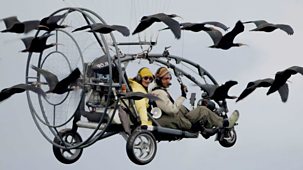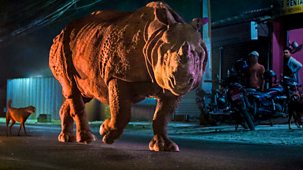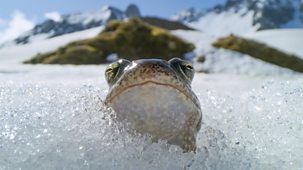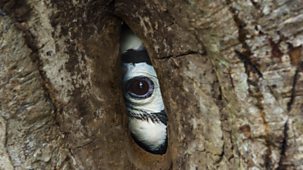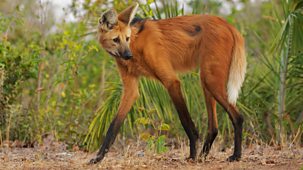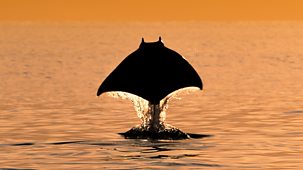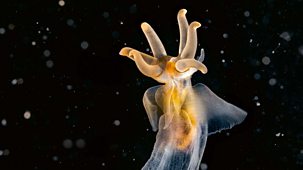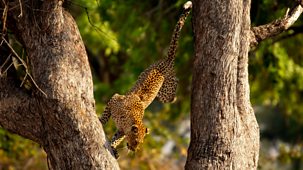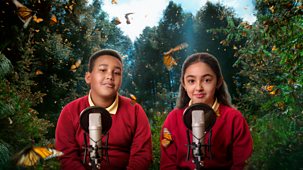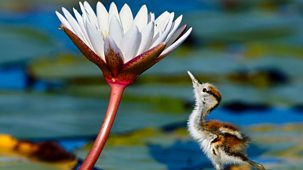
Series 1: 4. Freshwater
Fresh water is the lifeblood of planet Earth and the stage for extraordinary animal dramas. \n\nIn the heart of the Costa Rican rainforest, a little-known spectacle unfolds above a very special pond. Up to ten thousand gliding tree frogs – the world’s largest known gathering of its kind – descend from the canopy for the most important breeding event of the year. It will only last a day, and with males outnumbering females nine to one, competition is fierce. This is a party you don’t want to be late for.\n\nMeanwhile, in Sri Lanka, as the dry season reaches its peak, the last remaining waterhole for miles around becomes a magnet for a different animal: mugger crocodiles. Giants up to five metres long lurk beneath the surface, waiting patiently for thirsty chital deer to approach the waterhole for a drink. But catching their prey is no easy feat and requires them to do something extraordinary. Documented nowhere else, these crafty crocodiles have learned how to exploit their prey’s need for fresh water - by creating traps. \n\nNestled amongst flowering water lilies, newly hatched ‘lily-trotter’ chicks learn a vital lesson – how to ‘walk on water’. Their oversized feet - almost double the length of their body – make for a wobbly start, but their dedicated father will do whatever it takes to keep them safe during the most vulnerable stage of their life. \n\nOne of the biggest challenges of living in a freshwater world is its dynamic nature. It can appear, vanish or transform rapidly. Survival in these dynamic environments hinges on adaptation. In the Okavango Delta, the arrival of the great annual flood poses a significant challenge for a pack of five African wild dogs. On dry land, they are one of the continent’s most successful hunters, but as their hunting grounds turn to swamp, they must find an innovative way to master this water world. \n\nMeanwhile, millions of goby fish on the remote volcanic island of Bioko prepare for a perilous journey. After months feeding out at sea, they return to fresh water to breed. The safest place to lay their eggs is where ocean predators can’t follow – at the very top of a 30m waterfall. Surely an impossible journey for a fish only an inch long, and one that will require a bizarre physical transformation.\n\nIn a few rare places, like Lake Malawi, fresh water has remained a consistent presence for millions of years, resulting in a dazzling diversity of life. Here, over a thousand unique fish species thrive - more than any other lake on earth, but competition in these crowded waters is intense. To survive here takes ingenuity. Meet Nimbochromis livingstonii - a master of deception that tricks other fish into thinking it's dead. \n\nFresh water is vital to life, yet it is a finite resource. Of all the water on earth, only 2.5 per cent is fresh and most of that is locked up as ice or hidden deep below ground. In fact, less than one per cent of fresh water is accessible. \n\nHumans rely on fresh water for drinking, agriculture, irrigation, industry and power. Throughout history, we have devised extraordinary means to ensure it is always available for every demand, fostering the dangerous illusion that it is infinitely abundant. Yet today, two-thirds of our world’s great rivers no longer reach the sea, and in the last 50 years, freshwater species have seen an 83 per cent decline globally – a faster decline than that of species in any other habitat. \n\nOne animal suffering on the front line is the Indus river dolphin in Pakistan. This species is the most endangered freshwater dolphin globally, with only around two thousand individuals remaining. Every year, these dolphins get trapped in the network of irrigation canals which form part of the vast Indus Basin irrigation system – the largest such system on earth. These canals divert water from the Indus River to irrigate crops. As water levels drop due to agricultural demands, the dolphins become stranded in ever-shrinking pools, often hundreds of kilometres away from the main river. Their only hope for survival depends on the efforts of a dedicated rescue team, working to return them back to the river before it’s too late.
Source: BBC 1
Most recent episodes of Planet Earth III
Planet Earth Iii
Series 1: 8. Heroes
All around the world, there are heroes on the frontline of conservation who are risking everything in the fight to save wildlife. Sir David Attenborough introduces this programm ...
31-05-2025
BBC 1
Planet Earth Iii
Series 1: 7. Human
The human world, from our cities to our fields, has spread to every corner of the globe. Wildlife must now adapt to a vastly altered landscape… and contend directly with ...
11-05-2025
BBC 1
Planet Earth Iii
Series 1: 6. Extremes
David Attenborough reveals the extraordinary ways in which animals battle to survive the elements in a world of extremes - places where life exists on a knife edge. From mountai ...
05-05-2025
BBC 1
Planet Earth Iii
Series 1: 5. Forests
Sir David Attenborough journeys into the hidden world of forests, where lives are entwined in the most unexpected of ways. From the temperate rainforests of Canada, where rarely ...
27-04-2025
BBC 1
Planet Earth Iii
Series 1: 4. Freshwater
Fresh water is the lifeblood of planet Earth and the stage for extraordinary animal dramas. \n\nIn the heart of the Costa Rican rainforest, a little-known spectacle unfolds abov ...
20-04-2025
BBC 1
Planet Earth Iii
Series 1: 3. Deserts And Grasslands
In the baked Namib desert, a pair of ostriches raise their family in the searing heat to keep them safe from predators – but time is ticking as the chicks begin to hatch. ...
30-03-2025
BBC 1
Planet Earth Iii
Series 1: 2. Ocean
Much of our world remains virtually unexplored because most of it is under water. The ocean covers two-thirds of the planet and is home to 80 per cent of all animal life. Yet we ...
22-03-2025
BBC 1
Planet Earth Iii
Series 1: 1. Coasts
Sir David Attenborough explores the dangerous frontiers created by the world's coasts, where animals fight for survival amidst constant change.\n\nOn South Africa’s Robber ...
16-03-2025
BBC 1
Planet Earth Iii
Series 1: Wonders Of Nature
This special episode brings together highlights from the series, from hidden forests and turbulent coasts to vast, unexplored deserts. \n\nWe begin in the oldest desert on earth ...
03-01-2025
BBC 1
Planet Earth Iii
Narrated By Kids
This special Earth Day episode of Planet Earth III is narrated by schoolchildren across the UK. Because you don’t have to be Sir David Attenborough to become a voice for n ...
06-05-2024
BBC 1
Most popular episodes of Planet Earth III
Planet Earth Iii
Series 1: Wonders Of Nature
This special episode brings together highlights from the series, from hidden forests and turbulent coasts to vast, unexplored deserts. \n\nWe begin in the oldest desert on earth ...
03-01-2025
BBC 1
Planet Earth Iii
Series 1: 7. Human
The human world, from our cities to our fields, has spread to every corner of the globe. Wildlife must now adapt to a vastly altered landscape… and contend directly with ...
11-05-2025
BBC 1
Planet Earth Iii
Series 1: 8. Heroes
All around the world, there are heroes on the frontline of conservation who are risking everything in the fight to save wildlife. Sir David Attenborough introduces this programm ...
31-05-2025
BBC 1
Planet Earth Iii
Series 1: 3. Deserts And Grasslands
In the baked Namib desert, a pair of ostriches raise their family in the searing heat to keep them safe from predators – but time is ticking as the chicks begin to hatch. ...
30-03-2025
BBC 1
Planet Earth Iii
Series 1: 6. Extremes
David Attenborough reveals the extraordinary ways in which animals battle to survive the elements in a world of extremes - places where life exists on a knife edge. From mountai ...
05-05-2025
BBC 1
Planet Earth Iii
Series 1: 2. Ocean
Much of our world remains virtually unexplored because most of it is under water. The ocean covers two-thirds of the planet and is home to 80 per cent of all animal life. Yet we ...
22-03-2025
BBC 1
Planet Earth Iii
Series 1: 5. Forests
Sir David Attenborough journeys into the hidden world of forests, where lives are entwined in the most unexpected of ways. From the temperate rainforests of Canada, where rarely ...
27-04-2025
BBC 1
Planet Earth Iii
Series 1: 4. Freshwater
Fresh water is the lifeblood of planet Earth and the stage for extraordinary animal dramas. \n\nIn the heart of the Costa Rican rainforest, a little-known spectacle unfolds abov ...
20-04-2025
BBC 1
Planet Earth Iii
Narrated By Kids
This special Earth Day episode of Planet Earth III is narrated by schoolchildren across the UK. Because you don’t have to be Sir David Attenborough to become a voice for n ...
06-05-2024
BBC 1
Planet Earth Iii
Series 1: 1. Coasts
Sir David Attenborough explores the dangerous frontiers created by the world's coasts, where animals fight for survival amidst constant change.\n\nOn South Africa’s Robber ...
16-03-2025
BBC 1


